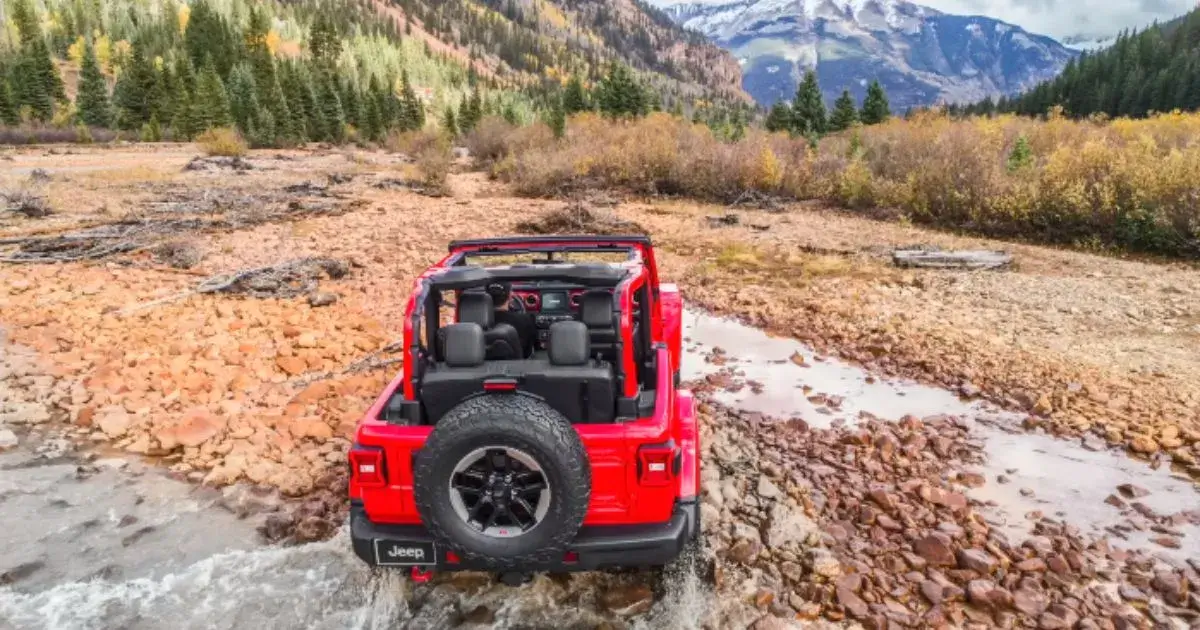In short, Jeeps are not known for their fuel efficiency. The average gas mileage for a Jeep is around 17 miles per gallon (MPG) in the city and 23 MPG on the highway, which is not great compared to other vehicles on the market.
However, newer Jeep models including Jeep Grand Cherokee have improved fuel efficiency, with some getting up to 25 miles per gallon. It’s also important to note that the amount of gas a Jeep uses depends on how you drive it. If you’re taking it off-road and pushing it to its limits, you can expect to use more gas than if you’re driving it on the highway.
If you’re considering buying a Jeep, it’s important to weigh the benefits of its off-road capabilities against its fuel efficiency. With proper maintenance and mindful driving habits, you can still enjoy the ruggedness and adventure that Jeeps are known for while also being more fuel-efficient. So, let’s dive into the world of Jeeps and explore their gas mileage in more detail!

What is Gas Mileage?
Gas mileage refers to the amount of fuel a vehicle consumes to travel a certain distance. The distance traveled per gallon of fuel is commonly referred to as miles per gallon (MPG). Several factors can influence gas mileage, such as the vehicle’s weight, engine size, and driving habits.
In the case of Jeeps, gas mileage can vary depending on the specific model and its features. For instance, a Jeep with a larger engine or heavy off-road tires may have lower gas mileage compared to a Jeep with a smaller engine or more fuel-efficient tires.
Understanding gas mileage is important for Jeep owners because it can affect their fuel costs and overall driving experience. By adopting certain driving habits or making modifications to their Jeeps, owners can improve their gas mileage and save money in the long run.
Gas Mileage of Jeeps
The gas mileage of Jeeps can vary depending on the specific model and its features. On average, Jeeps get around 17-20 MPG in the city and 20-24 MPG on the highway. However, the Jeep Wrangler, a popular off-road model, has a gas mileage of around 17-23 MPG.
Modifications or upgrades to a Jeep can also affect its gas mileage. For example, larger tires or a lift kit can increase weight and decrease aerodynamics, leading to lower gas mileage. Despite their lower gas mileage compared to some other vehicles, Jeeps are still a popular choice for those who value their off-road capabilities and rugged design.
Despite their lower gas mileage compared to some other vehicles, Jeeps are still a popular choice for those who value their off-road capabilities and rugged design. It’s important for Jeep owners to understand their vehicle’s gas mileage and take steps to improve it, such as maintaining proper tire pressure and avoiding aggressive driving habits.
Advantages of Jeeps’ gas mileage
1. Off-road adventures: Jeeps are known for their off-road capabilities, and their gas mileage allows owners to explore remote locations without having to stop and refuel frequently. Plus, the fun of driving a Jeep off-road is unbeatable!
2. Towing power: If you need a vehicle with high towing capacity, a Jeep is a great choice. Even when towing heavy loads, Jeeps maintain their gas mileage, making them ideal for hauling trailers or equipment.
3. Versatility: Whether you’re driving in snow, mud, or sand, a Jeep can handle it all. And with their gas mileage, you can enjoy this versatility without worrying about fuel costs.
4. Resale value: Jeeps hold their value well, which means that when it’s time to sell or trade in your vehicle, you can recoup a significant portion of your investment.
5. Fun factor: Driving a Jeep is a blast, plain and simple. And with their gas mileage, you can enjoy that fun without worrying about spending too much on fuel.
Overall, Jeeps’ gas mileage provides a combination of off-road capabilities, versatility, and towing power, all while being cost-effective. So, if you’re looking for a vehicle that can handle anything you throw at it, a Jeep might just be the perfect choice for you!
Disadvantages of Jeeps’ gas mileage
1. Fuel costs: Jeeps generally have lower gas mileage than other vehicles in their class, which means that fuel costs can add up quickly, especially if you drive frequently or take long trips.
2. Modifications: If you’re the type of Jeep owner who likes to modify or upgrade your vehicle, keep in mind that certain modifications, such as larger tires or a lift kit, can decrease gas mileage even further.
3. Carbon emissions: Jeeps are known for their rugged design and off-road capabilities, but they do emit more carbon than some other vehicles, which can contribute to air pollution and climate change.
4. Maintenance costs: Jeeps require regular maintenance, and depending on the model and age of your vehicle, these costs can add up quickly.
5. Road noise: Jeeps have a unique design that can be noisy when driving on highways or paved roads. This can be a minor annoyance for some drivers, but others may find it to be a deal-breaker.
Tips to Improve Jeep Gas Mileage
1. Regular maintenance: Regular maintenance is essential to keep your Jeep running smoothly and efficiently. Be sure to follow the manufacturer’s recommended maintenance schedule, including regular oil changes, air filter replacements, and tire rotations. These small steps can help keep your engine running smoothly and increase your Jeep’s gas mileage.
2. Proper tire inflation: Your Jeep’s tires play a critical role in its gas mileage. Underinflated tires can decrease gas mileage and even lead to safety issues. Check your tire pressure regularly and keep your tires inflated to the manufacturer’s recommended levels.
3. Lighten your load: Every extra pound you carry in your Jeep decreases its gas mileage. Remove any unnecessary items from your Jeep, including cargo carriers, roof racks, and other accessories. Only carry what you need for your trip to improve your Jeep’s gas mileage.
4. Smooth driving: Aggressive driving, such as sudden acceleration or hard braking, can decrease your Jeep’s gas mileage. Try to drive smoothly and maintain a consistent speed, and avoid sudden stops and starts whenever possible.
5. Avoid idling: Idling your Jeep wastes fuel and decreases gas mileage. If you’re stopped for more than a minute or two, turn off your engine to conserve fuel.
6. Use cruise control: When driving on highways or long stretches of road, use cruise control to maintain a consistent speed and conserve fuel. This can help improve your Jeep’s gas mileage and make for a more comfortable driving experience.
7. Upgrade to a more efficient model: If you’re in the market for a new Jeep, consider a model with a more fuel-efficient engine. Diesel and hybrid models are available and can provide improved gas mileage compared to traditional gasoline engines.
How Much is Gas for a Jeep Wrangler Per Month?
The cost of gas for a Jeep Wrangler per month depends on a few factors.
The most important factor is the price of gas.
The second factor is the size of the Jeep Wrangler’s gas tank.
The third factor is the average miles per gallon (MPG) that the Jeep Wrangler gets. The price of gas has a wide range depending on where you live. For example, as of August 2018, the average price of regular unleaded gasoline was $2.86 per gallon in the United States.
However, prices can be much higher or lower than this depending on your location. For example, in Canada, the average price was $4.20 per gallon while in Europe it was around $6.30 per gallon.
Assuming you drive your Jeep Wrangler an average of 30 miles per day, that would come out to about 900 miles per month. If your Jeep Wrangler has a 20-gallon tank and gets 18 MPG, then you would need to fill up your tank about 2 times per month which would cost approximately $57 per month ($2.86 x 20 gallons x 2 fills).
Therefore, if gas prices were to stay constant at $2.86 per gallon, your monthly expenditure on gasoline for your Jeep Wrangler would be around $114 ($57 x 2). Of course, these are just estimates based on averages and will vary depending on individual circumstances such as driving habits and vehicle efficiency.

Are Jeep Wranglers Good on Gas
Are Jeep Wranglers Good on Gas? This is a question that many people ask when they are looking to purchase a new vehicle. The answer may surprise you, but Jeep Wranglers are actually quite good on gas!
In fact, the EPA estimates that the Wrangler gets up to 21 MPG in the city and 28 MPG on the highway. Of course, your actual mileage may vary depending on a number of factors, including your driving habits and the way you maintain your vehicle.
But even if you don’t get quite those numbers, you can expect the Wrangler to be pretty fuel efficient for an SUV. So if you’re looking for a Jeep that’s good on gas, the Wrangler is definitely worth considering!
Jeep Wrangler 4 Door Gas Mileage
The new Jeep Wrangler 4 Door comes with a lot of great features that help improve its gas mileage. One of these is the EcoDiesel engine option which is said to get up to 30 miles per gallon on the highway. The other big change for 2018 is the addition of the 8-speed automatic transmission.
This helps improve both fuel economy and performance. Overall, the Jeep Wrangler 4 Door Gas Mileage is much improved for 2018 and should help save you money at the pump!
How Much Gas Do Jeeps Use?
If you’re looking to save money on gas, buying a Jeep may not be the best idea. On average, Jeep models get about 20-25 mpg. This means that if you’re driving a Jeep with a 20 gallon tank, you’ll need to fill up every 400-500 miles.
Of course, this number will vary depending on your specific model and driving habits. So how much does it cost to fill up a Jeep? At $3 per gallon, it would cost you $60-$75 to fill up your tank.
Keep in mind, this is just an estimate – gas prices are constantly fluctuating so your actual costs may be higher or lower than this depending on the market. If you’re considering buying a Jeep, make sure you factor in the extra costs of fuel into your budget. Otherwise, you may find yourself shelling out more money at the pump than you anticipated!
How Long Does Gas Last in a Jeep?
If you own a Jeep, you’re probably wondering how long the gas will last. Here’s what you need to know. On average, a Jeep will get about 12-15 miles per gallon.
However, this number can vary depending on the model of Jeep and how it is driven. For example, if you have a smaller Jeep, such as the Wrangler, you may only get 10-12 mpg. But if you have a larger Jeep, such as the Grand Cherokee, you could get up to 20 mpg.
Of course, these are just averages and your actual mileage may vary. If you want to maximize your gas mileage, there are a few things you can do.
First, make sure your tires are properly inflated.
Second, avoid using the air conditioning unless absolutely necessary – it can really drain your gas tank quickly!
Finally, try to drive at moderate speeds whenever possible; speeding uses up more gas than necessary. Assuming you have a full tank of gas (15 gallons), here’s how long it will last based on different mpg averages:
| 10 mpg = 150 miles 12 mpg = 180 miles 15 mpg = 225 miles 20 mpg = 300 miles |
So there you have it! Now that you know how long gas lasts in a Jeep under various conditions, be sure to plan ahead for your next road trip accordingly!
How Much Does It Cost to Fill Up a Jeep With Gas?
Assuming you are talking about a Jeep Wrangler with a 3.6L V6 engine, it will take approximately 15.5 gallons of gas to fill up the tank. At an average price of $2.50 per gallon, it would cost you about $38.75 to fill up your Jeep Wrangler’s gas tank.

FAQs
Do Jeeps use a lot of gas compared to other vehicles?
Yes, Jeeps typically use more gas than other vehicles due to their heavier weight and powerful engines. However, the amount of gas consumption can vary depending on the Jeep model and driving conditions.
How much gas does a Jeep use per mile?
The gas mileage of a Jeep can vary depending on the model and driving conditions. On average, a Jeep may get around 15-20 miles per gallon.
Can I improve my Jeep’s gas mileage?
Yes, there are several ways to improve your Jeep’s gas mileage, such as keeping the tires properly inflated, driving at a consistent speed, avoiding excessive idling, and regularly maintaining your Jeep’s engine.
Is it expensive to fill up a Jeep’s gas tank?
It can be more expensive to fill up a Jeep’s gas tank compared to other vehicles due to their larger gas tanks and higher fuel consumption. However, the actual cost will depend on the current gas prices and the size of your Jeep’s gas tank.
Should I avoid buying a Jeep because of its gas consumption?
The decision to buy a Jeep should not be solely based on its gas consumption. If you are looking for a rugged and versatile vehicle that can handle off-road adventures, a Jeep may be the perfect choice for you. However, it is important to factor in the cost of gas when considering the overall cost of owning a Jeep.
The Only Jeep You Should Buy
Final Thoughts
The question of whether Jeeps use a lot of gas is not a simple one to answer. While Jeeps are not known for their fuel efficiency, it’s important to understand that there are many factors that can impact gas mileage. The specific model of the Jeep, driving conditions, and maintenance habits all play a role in determining how much gas a Jeep will use.
Ultimately, the decision to buy a Jeep will depend on your individual needs and priorities. But with the information provided in this article, you can make a more informed decision and potentially find ways to save on gas while still enjoying the adventure that Jeeps are known for.

